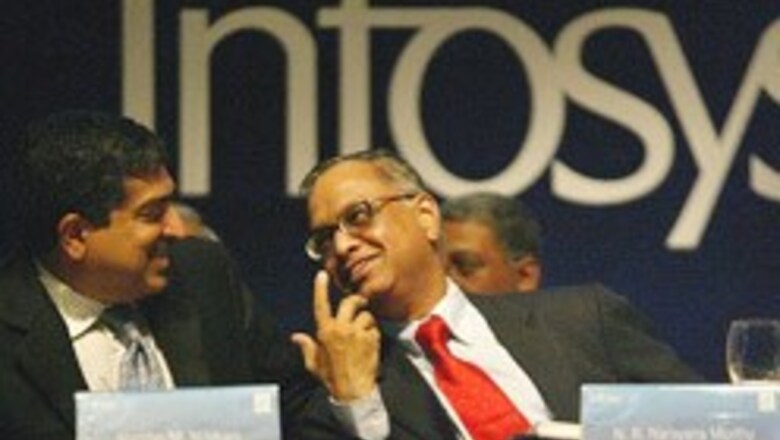
views
Bangalore: It was the proverbial end of an era as N R Narayana Murthy, the iconic founder of Infosys, stepped down Sunday after a quarter century of helming the Indian information technology bellwether.
Murthy, who turned 60 Sunday, handed over the executive chairmanship of the $2 billion firm to his long time colleague Nandan Nilekani.
But he remains non-executive chairman in which capacity he would continue to guide the fortunes of India's second largest software firm that has become synonymous with the country's rapid growth in this field.
Infosys is India's very own fairy tale - of few whiz kids 25 years ago who had grit, vision and little else when they began a corporate adventure that would turn a round planet into a flat world over which their $2 billion company Infosys had absolute reign.
In a saga that is the stuff of legends, the seven co-founders of Infosys Technologies Ltd, led by Narayana Murthy and Nilekani, have made their company a global brand and accelerated the country's progress on the IT highway.
Nilekani's famous comment to Pulitzer winning columnist Thomas Friedman that the "playing field is being levelled", to mean that countries like India were now able to compete equally for global knowledge, spawned the famous "the world is flat" phrase.
The journey towards changing not just terminology but hundreds of thousands of lives started in 1981 with a seed capital of just $250, most of it borrowed from devout spouses.
With virtually empty pockets and little infrastructure, but full of dreams, the co-promoters set out to build a tech behemoth that now employs over 55,000 techies, generates $2 billon plus revenue annually and commands a market capitalisation of $22 billion.
Besides Narayana Murthy and Nilekani, the other co-promoters are deputy managing director and chief operating officer S Gopalakrishnan, directors K Dinesh and Shibulal, and former founder-directors N S Raghavan and Ashok Arora.
Narayana Murthy put the initial years of struggle into perspective at the recent silver jubilee celebrations of the company.
"As I stand here, several images pass through my mind. Waiting at the entrance of the RBI month after month with my friend at other times with my wife (Sudha) and a few times with my young daughter (Akshata) for four-to-six hours just to get our own hard-earned dollars to support my six other founders," said Murthy.
He said Infosys pioneered wealth creation by sharing its fortunes across the social strata.
"When one of our attendants (Ramachandrappa) told me recently that he had built a fabulous house, I knew our experiment in democratisation of wealth had achieved success and had served the purpose."
Steering through a decade of trials and tribulations, when getting a phone connection, buying a computer and regulatory approval for a fistful of dollars were more difficult than writing software code for their first client - the New York-based Data Basics Corporation - India's IT pioneers saw their fortunes turn around with the advent of liberalisation in the 1990s.
By then, the protagonists had shifted their small company from the western Indian city of Pune to Bangalore, India's silicon hub, for setting up the country's first largest software development facility and spread their tentacles across the country and overseas.
"Infosys is not a mere company selling software and allied services, but a global corporation, with an enduring value system based on openness, honesty, integrity, meritocracy, fairness, transparency and excellence that have become benchmarks for others to emulate," says Murthy.
Apart from scaling new heights and spreading its footprints globally, Infosys became the first Indian firm to usher in an era of wealth creation by offering stock options to its employees a year after going public in 1993 and making millionaires out of commoners.
Even as it kept pace with the changing technologies and took advantage of the off-shoring and outsourcing wave, the rapid increase in revenues, profits and client base, predominantly in the US, made it a blue-chip firm, attracting hordes of institutional and retail investors to reap a fortune on the bourses year after year.
Having tested domestic waters and consolidated its presence in the global IT space, Infosys became the first Indian company to enter the US capital market by listing on the Nasdaq in 1999.
"Global benchmarking has helped us emulate the best in class to service our customers better. Following the best practices of corporate governance, highest accounting standards and total transparency attracts the best investors," Narayana Murthy told his rich shareholders in June at the company's 25th annual general meeting.




















Comments
0 comment